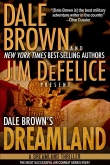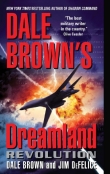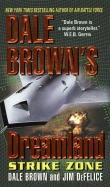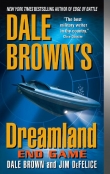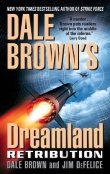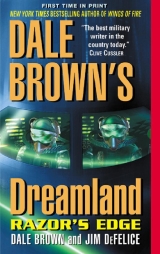
Текст книги "Razor's Edge"
Автор книги: Dale Brown
Жанр:
Боевики
сообщить о нарушении
Текущая страница: 3 (всего у книги 22 страниц)
41
of which wouldn’t be much help in locating the pilot. But the damn thing could pick up all manner of radio communications a hundred miles out. Not worth the risk?
Mack looked at Elliott. Was this the same general who’d defied Washington and half the Air Force to get DreamStar back? The general who’d personally flown a suicide mission to Russia to prevent World War III?
The General Brad Elliott?
He looked tired, face white, pockmarked with age and fatigue, maybe even fear.
“I want to fly one of the F-16s,” Mack told Hashek. “I want to be in on this.”
Hashek turned toward him. “Thanks, Major, but we’re full up.”
“No offense to your guys, but I can fly circles around them. I can.”
“Sorry,” said Hashek. Two other men entered the office, both in flight suits. The colonel nodded at them. “I’m sorry, General, I have some business to attend to.”
“I want to be on the mission,” insisted Mack. “I don’t really feel like twiddling my thumbs back here. Hey, Colonel.” Mack caught Hashek’s arm as the colonel started to leave with the other men. “Give me a break, huh? Anything. I’ll go on the Herk even.”
“Mack, you will be in the middle of things,” said Elliott. “I want you on a Pave Low.”
“A Pave Low?”
Mack let go of Hashek’s arm. The colonel looked at him like he was an ant before stalking out, his pilots in tow.
“I’ve never flown an MH-53, General,” said Mack, who in all honesty had never even sat in the front seat of a helicopter. “But I’ll figure it out. Hell, I can fly anything.”
“I don’t want you to fly it,” said Elliott. “I’m assuming they didn’t send you to Brussels to give that seminar on 42
DALE BROWN’S DREAMLAND
missile damage just because they wanted to get rid of you.”
“Um, well, no,” said Mack, not quite sure what the point of the general’s sarcasm was.
“There should be a Huey waiting to take you to the helicopters. Find a camera and anything else you need, then get there.”
Over Iraq
0701
TORBIN HUNKERED OVER THE RADAR DISPLAY IN THE BACKseat of the Phantom, every cell in his body sensitive to its flicker. Traditional Weasel missions contained a fairly short stay over hostile territory, generally organized around a ten-minute spiral to low altitude as the pitter tracked radars and then launched missiles against well-briefed targets. Today’s mission was far more open-ended and demanding, even compared to the freelancing gigs they’d been doing for the past few weeks. Overflying the area where Falcon Two had gone down, they would fire on anything that turned on during the hunt. They’d stay in the air for as long as it took to find the pilot and drag him back to safety. That meant three or more hours of staring at the small tube in front of him.
Four Iraqi SAM sites had been targeted for attack in strikes set to be made at the moment Glory B crossed the border. In theory, those attacks would remove the major threats the searchers faced. But reality had a way of differing from the nice crisp lines and lists of call numbers drawn on maps. Those attacks might simply stir the hor-nets’ nest.
“We’re on track,” said Fitzmorris. “Zero-three to Box able-able-two.”
RAZOR’S EDGE
43
“Zero-three,” acknowledged Torbin. They’d been like that the whole flight, nothing but business.
Fitzmorris obviously thought he’d fucked up somehow.
Probably because he was a pilot—they stuck together.
“Scope clean,” Torbin said as they reached the grid area where the Falcon had gone down. The blue-gold tint of dawn would shade the mountains a beautiful purple, but he kept his eyes on his radar screen.
The other planes in the flight checked in, the Herky bird driver nonchalantly trading jibes with one of the F-16s escorting him. The transport plane was a spec ops version equipped for deep penetration of enemy lines, but that usually occurred at night and at low altitude. He was now at roughly twenty thousand feet, above flak but an easy target for a SAM.
Not today. Not with Torbin on the job, he thought. He blew a wad of air into his mask, then pushed his neck down, trying to work out a kink. He tracked through his instruments quickly, then glanced to his right console, double-checking his key settings out of habit. His eyes strayed briefly to the small toggle beyond the telephone-style keypad. Long ago the thin thumb had safed—or unsafed—nuclear stores.
We ought to just fry the sons of bitches and be done with it once and for all, he thought.
He jerked his eyes back to his job, pushing his face down toward the blank radar scope.
“What?” asked Fitzmorris.
“Scope’s clean.”
“Copy that.”
The static-laced silence returned. Torbin pushed himself up against his restraints. Inevitably his attention began to drift; inevitably he thought of the construction job that waited if he quit the Air Force.
Or if they forced him out as a scapegoat.
44
DALE BROWN’S DREAMLAND
It’s what he got for wanting to be where the action was.
Should have stayed in the Pentagon, or used his stinking engineering degree at NASA like they suggested.
Screw that. And screw getting out. He didn’t want to build houses.
“Falcon Two to any allied aircraft.”
The transmission sounded like a snippet of dialogue from a TV in another room.
“Glory B to Falcon Two,” said Torbin. “Falcon Two?
I’m reading you, boy. Acknowledge.”
As Torbin clicked off, the frequency overran with six or seven other voices, all trying to make contact with their downed comrade.
“Radio silence! Radio silence!” shouted Fitzmorris.
“Falcon Two, identify yourself.”
“Captain Terry McRae,” came the answer. “I’m sure glad to hear you guys.”
“We’re glad to hear you,” said Torbin. “Give us a flare.”
“Slow down—we have to go through authentication first,” said Fitzmorris.
“Copy that,” said McRae from the ground. “But let’s move, okay? I am freezing my butt off down here.”
Torbin knew no Iraqi would have said that, but Fitzmorris dutifully checked with the AWACS controller and began relaying personal questions designed to make sure McRae really was McRae.
“I can see you and your smoky tailpipe, Glory B,” the pilot told them as they finished. “And by the way, you guys must have missed an SA-2 or something yesterday.
Smoked the shit out of me. I never saw the damn thing.”
“We’re sorry for that,” said Fitzmorris.
“Why do you think it was an SA-2 if you didn’t see it?”
asked Torbin, his voice sharper than he wanted.
“What else could it have been?”
RAZOR’S EDGE
45
Torbin bit his lip to keep from answering. The pilot had enough to worry about for the time being.
Over Iraq
0750
MACK SMITH TRIED TO STEADY HIMSELF ON THE SEAT
across from the minigun station as the big Pave Low whipped through a pass in the mountains, rushing toward the spot where the pilot had been sighted. The big helicopter tucked sharply left, the tip of its rotors about ten feet from a sheer wall as it hunkered through a pass. The low altitude tactics made it nearly impossible for an enemy radar to detect them, but at this point Mack would have traded a little safety for a smoother ride. It was one thing to jink and jive when you had the stick yourself, and quite another to be gripping the bottom of a metal ledge in the back of a flying pickup truck.
He’d managed to get out of his jeans and sport coat and into a borrowed flight suit. The boots were a little small and his shoulders felt cramped across the back, but at least he looked like he actually belonged here. The crewmen had given him a helmet connected to the com system via a long umbilical cord.
“We’re zero five from the crash site,” yelled the copilot.
“We’re holding back as reserve until we’re sure they’ve got the pilot. Then we’ll move in and put you down.
Smoky’ll go out with you. How long do you need?”
“I don’t know,” said Mack. “Half hour? I have to take some pictures. See what I see. Kick the tires, check the lights.”
The copilot didn’t laugh. “Ten minutes, max. The Iraqis are all over the place down there.”
46
DALE BROWN’S DREAMLAND
Over Iraq
0805
TORBIN TOOK HIS EYES OFF HIS RADAR SCREEN MOMENTARily as the Phantom tucked southward. The helicopter that had been tabbed for the pickup was now talking directly to the downed pilot, who had managed to climb about a third of the way up a crag about a mile from a dirt road.
This was serious mountain country, but it wasn’t entirely uninhabited—a hamlet big enough to host a mosque sat about a mile and a half to the south, and Torbin saw, or at least thought he saw, the blurred shadows of some other buildings closer to the east.
Torbin turned his head back toward the radar when something in the sky caught his eye. A red light sparkled in the distance.
McRae’s flare.
Hot damn.
“Lookin’ good,” said the Pave Low pilot over the circuit. “Hang tight. We’ll be on you in thirty seconds.”
“Yeah, I’m doing my nails,” said the pilot.
Torbin studied his scope. There had been a few brief, long distance flickers, nothing long enough to actually grab on to.
How could they even think he’d screw up? Saddam had nothing up here that could catch even an unescorted F-16.
All he had up here was shit. The SA-2’s Fan Song radar?
Crap. The low PRF was surprisingly good at picking up stealth aircraft, though it hadn’t been designed for that.
But it was easily jammed. The SA-3? Arguably better, or at least more variable, supported by Spoon Rest and a Side Net, or Squat Eye with a Flat Face and Thin Skin.
Garbage nonetheless. Tiny little wavy lines straight out of the sixties, competing with I Love Lucy and even Father Knows Best. The systems had been compromised RAZOR’S EDGE
47
years ago. Junk from the days when tubes ruled the world and transistors came one to a chip. SA-6s, Rolands, SA-8s—better, admittedly, but still outclassed, out-matched by the ECMs the Falcons carried.
Even if he had screwed up big-time—and he had not—
Torbin knew that the Falcon pilot should have had his jamming pod ready. He could have gone to his chaff, juked, jived—
The radar scope flared.
“I have a Three up,” Torbin told his pilot. One of the antennas on the Weasel frame had pulled the tight rap of a radar signal from the air. It held it there for him, waiting for him to catch up. He didn’t bother with the usual back and forth with the pilot, just went for it. The RIO’s fingers flew, cursoring the enemy, pushing the data to the missile, firing, nailing the son of a bitch.
“Away. Have another radar. Hold on, hold on—it’s a Two. Out of range. SA-2. I’m on it. I’ll nail it.”
“Torbin!”
“Dotted. I need you to turn, damn it! Get into him.”
“Fire at the bastard.”
“Two miles—I need two miles. Get us closer!”
The enemy missile site was at the edge of the HARM
missile’s range; they needed to draw closer to guarantee a hit.
No time. He fired.
Glory B jinked a second after the AGM-88 left her wing, taking evasive action.
Traveling at over 3.1 times the speed of sound, it took the antiradiation missiles nearly fifty seconds to reach their targets. Those were not the longest seconds of Torbin’s life, but they did take an eternity to pass. Finally, the warhead of the first missile detonated into several thousand shards of tungsten alloy, perforating the puny walls of the SA-3’s control van as well as a radar dish and 48
DALE BROWN’S DREAMLAND
all four of the missiles standing in the paired launchers.
Five seconds later a massive fireball erupted in the northern launch area of Iraqi Army Air Defense “Victorious Glory” Battalion Two, a piece of the HARM warhead igniting the liquid fuel stage of a Guideline missile that had been poised for launch.
In Iraq
0811
MACK HUGGED THE HELICOPTER’S SIDE AS HE MADE HIS
way to the rear ramp. A Ma Deuce .50 caliber machine gun sat in the middle of the opening, its long belt draped across the right side of the bay. The helo whipped around as it neared the wreckage, exposing its stinger to the crumpled metal on the side of the hill. The gunner angled the gun around as the helicopter spiraled; Mack nearly fell against the wall as the aircraft whipped practically onto its side before heading toward a small, relatively flat depression just below the slope.
A fat hand grabbed him by the shoulder. It was one of the pararescuers, “Smoky.” He’d traded his flight helmet for a soft campaign hat and had a Special Tactics Squadron 203—an M-16 with a grenade launcher attached—in his right hand.
“You ready, Major?” he shouted.
“Kick ass,” shouted Smith.
Smoky snorted. The helicopter jerked hard and the sergeant fell against Mack, the gun landing in his ribs. As Mack pushed him off, a volcano seemed to erupt just beyond the tail opening. Mack thought the gunner must be firing, then realized it was only the cloud of dust churned up by the rotors. He grabbed hold of something on the helicopter wall and threw himself toward the opening, fol-
RAZOR’S EDGE
49
lowing Smoky onto the ramp and then down to the ground, ducking instinctively and racing through the hail of dirt and rocks. Air rushed behind him as if a hole had just been blown in the side of the earth. In the next second he threw himself onto the slope, starting up hand over hand toward the wrecked F-16.
The dust had settled somewhat by the time he reached the wreckage. The Viper had slapped into the hillside almost nose first; most of the fuselage in front of the cockpit had disintegrated. The next six or seven feet of the plane had been crunched into about three-quarters of its original size; long ribbons of metal protruded from the twisted mass, as if they were the spines of a porcupine.
The jagged left wing sat down the slope, about twenty or thirty yards away. The rear tail fin was crumpled but more or less intact. The right wing was missing, sheered near the pylon fixing in a shallow diagonal away from the body of the plane. Some of the fuel system piping was visible; it seemed clean.
Mack reached for the tail fin. As his fingers neared the surface he hesitated, as if fearing it would be hot.
“What we lookin’ for?” asked Smoky, catching up behind him. The PJ had a microphone and headset so he could talk with the helicopter. He also humped a pack.
“Shrapnel holes, black streaks from a fire, basically a big hole or tear that can’t be explained by the impact,”
said Mack. Actually, the list went on and on—nearly twenty minutes during one of Mack’s lectures, not counting time flirting with any pretty girls in the audience.
He pulled out the small 35mm camera and began taking pictures, walking along the side of the downed aircraft. The missing wing was undoubtedly the key, though the break looked remarkably clean for a missile hit.
Possibly torn off in flight after being weakened by a 50
DALE BROWN’S DREAMLAND
fire, though the fact that the fuel piping hadn’t burned meant …
Meant what?
“Missile?” Smoky asked.
“Yeah,” said Mack. “Probably took off the wing, exploded the fuel tank in the wing.”
“Wow.”
There had definitely been an explosion—there were shrapnel holes all over the place. But no fire?
Too wide a spread for a missile, actually, unless the explosion had been right under the wing or maybe in it, smashed it to smithereens so that this jag and that one, and that one and all the others, were from the wing sharding off.
“This thing catch fire?”
“No.” Mack shrugged. “Sometimes you get a fire, sometimes you don’t. This looks like a pretty direct hit with a really good-sized warhead.”
He remembered a crash he’d seen where there hadn’t been a fire—the accident that had claimed Jeff Stockard’s legs. Funny that he remembered that and not his own shoot-down a few months ago.
“Wow, look at these holes,” said Smoky, pointing to the belly of the plane. “Flak?”
Mack bent down to take a look. “Too varied. Probably from the explosion. Besides, see how this folded down there? This damage here was from the impact. Metal came away. See the bolt on that panel? Gave way.” He stepped back and took a picture.
Two small warheads maybe? Happened to hit just right and snapped the wing clean off?
He’d want odds on that.
“A missile probably got the wing and exploded it. That big an explosion, though—I don’t know. Pilot got out.”
He went to study the cockpit, which had been munched by the impact into the mountain. Still—no fire.
RAZOR’S EDGE
51
Mack walked back to the right wing root. The wing had almost certainly been sheered off before impact.
He’d need to see it.
Some parts of the root were white, as if the metal had been on fire and just disintegrated into powder. But there clearly had been no fire. Mack bent over an internal spar; the bolts were loose.
Sympathetic vibrations after the explosion, he thought, shock wave knocks the metal loose.
He took some pictures.
What the hell missile hit them? An SA-2?
That clean, it had to be something smaller. Three little shoulder-fired missiles?
Three heat-seekers all nailing the wing? Very strange.
Crashes were strange by definition. Mack stood back and took pictures, changed his film, took more pictures.
The engineers could tell a lot by looking at the way the metal had been bent; those guys were the real experts. He was just a moonlighting pilot who’d happened to command a crash investigation during the Gulf War. He moved in for close-ups, then bent his head under the fuselage.
The metal was scraped and not exactly smooth. Some panels and spars seemed to have buckled, probably on impact. He saw a few more loose bolts and popped rivets, but nothing here contradicted his theory that the damage emanated from the right side of the plane.
Nice to find that right wing, he thought. Real nice.
He backed off the plane onto the top of the slope, taking more pictures as he walked upward.
Stockard had managed to eject after a collision with a robot plane he was piloting from an F-15E Eagle. He’d been way low when he went out, and his chute never had a chance to fully deploy—though it was never clear to Mack whether he’d been injured going out or landing.
His plane had been a mangled collection of thick silver 52
DALE BROWN’S DREAMLAND
string strewn over the desert test area where they were flying at the time. Mack could close his eyes and still see Zen’s body lying in a heap against the flat dirt, the lines to his parachute still attached. The canopy had furled awkwardly, as if trying to pull him to his feet.
What if a stream of flak had shot through the metal, exploded the wing tank, sliced the wing right off, he asked himself.
Not to be totally ruled out—except for the shrapnel over the rest of the plane’s body. The wing definitely seemed to have exploded.
Had to be a missile, had to have ignited the wing tank.
Except that it clearly hadn’t.
Mack took some more photos, then stopped to change the roll. As he closed the back of the camera, Smoky came running across the rocks.
“We got problems, Major!” shouted the PJ. “Company coming.”
Before Mack could answer, the ground shook and he fell backward against the hillside, the roar of an exploding tank shell blaring in his ears.
Over Iraq
0815
AS THE PAVE LOW LIFTED OFF WITH THE INJURED PILOT, Torbin and Fitzmorris saddled up to go home with the rest of the escorts. The Wild Weasel ducked her wing gently to starboard, steaming gracefully into a turn. Her turbines chewed on the carcasses of a thousand dead di-nosaurs; the slipstream melted into a swirl of blue-white vapor. Torbin jerked his bulky frame forward, still minding his gear but more relaxed now, redeemed by the hits on the missile control radars.
RAZOR’S EDGE
53
Let them try and say he fucked up now, he thought. He had two fresh scalps to prove he hadn’t.
Screw building houses. Honorable profession, oh yes, but just not what he wanted to do right now, even if his brother-in-law’s cousin Shellie was pretty good-looking.
Find some sort of job doing something worthwhile.
Crew on a stinking AWACS if it came to that.
Torbin pushed his legs against the side consoles, stretching some of the cramps out of them. He rolled his shoulders from side to side, still watching the threat scope. They had a long haul home, made all the longer by the fact that the Pave Low they were accompanying would be lucky to top 175 knots.
A jumble of happy voices filled the radio as the escorts checked in with the AWACS. Then the pilot in the second Pave Low called for radio silence.
“Flag Two has vehicles on the roadway,” said the strained voice over the loud cluck of helicopter blades in the background. “I’m looking at two BMPs, a tank maybe.”
“Snake One acknowledges,” answered the leader of the F-16 flight.
Torbin did a quick check of his gear as his pilot rejig-gered their plans—they’d dog south to provide cover for the F-16s wheeling to attack the vehicles.
“How you doing back there?” Fitzmorris asked as they came to the new course bearing.
“Not a problem.” Torbin shrugged. “Scope’s clean.”
In Iraq
0821
THEY WERE NAKED ON THE SIDE OF THE HILL, EXPOSED TO
the tank firing from the dirt road two hundred yards away.
54
DALE BROWN’S DREAMLAND
Mack spotted a large group of boulders on his right and began sliding toward it. Smoky had the same idea, but not nearly as much balance—he flopped past Mack, just out of his grasp as another shell hit the hillside, this one so close that Mack smelled the powder in the dirt that flew against his helmet. He tumbled after the sergeant, rolling over three or four times before landing on his belly and sliding another four or five feet. He pulled himself up against the rocks, twisting his head back to get his bearings. Smoky’s leg lay nearby, off at an odd angle.
Severed?
It began to writhe, and Mack felt his stomach falling backward into a vacuum.
The dirt beyond the leg moved. “Jesus, this hurts like hell,” groaned Smoky, unfolding himself from the ground.
Mack stumbled over, took his arm and dragged him behind the rocks. Another volley resounded against the hillside. Mack heard the MH-53 hovering in the distance, then something else.
“Duck!” he yelled.
If the bomb whistled in—and undoubtedly it did—he never heard it. What he did hear was the muffled crack of a pair of five-hundred-pound iron bombs bracketing the turret of a T-62 Iraqi main battle tank. A chain of explosions followed as a second F-16 loosed a pair of cluster bombs on the other vehicles. The bombs hit slightly to the south of their aim point, the pilot’s mark thrown off slightly by the gusting wind and the vagaries of trying to hit a moving object while diving at five or six hundred miles an hour from fifteen thousand feet. Nonetheless, the loud rumble of a secondary explosion followed the rapid-fire popcorn of the bomblets going off.
The earth shuddered and Mack found himself lying flat on his back, eyes cupped with grit. He flailed his elbows, RAZOR’S EDGE
55
struggling to get upright like a frog tossed on his back.
When he finally got to his feet, he realized he’d pulled Smoky up with him.
“I’m all right, I’m all right,” said the PJ.
“We got to get ourselves out of here,” said Mack.
“Where’s the helicopter?”
“He cleared back to let the fighters in,” said Smoky, who’d lost his headset somewhere. “He won’t leave us, I guarantee.”
“Where the fuck is he?”
“He’ll be back.” The sergeant put some weight on his right leg, grimaced, then fell against the rock.
“All right, come on,” said Mack, though he wasn’t exactly sure where they were going.
“You don’t have to carry me,” said the sergeant.
“I ain’t fuckin’ carrying you,” snapped Mack. “Just lean on me. We’ll go back to the flat where they dropped us. Shit—what are you doing?”
As Smoky swung his 203 up from his side, Mack ducked back, sure that the sergeant had lost his mind and was about to waste him.
Two quick bursts later something fell from the hillside above the airplane behind them.
A dead Iraqi soldier.
“Come on!” yelled Mack.
“Smoke!”
“What?”
As the sergeant reached below his vest, Mack took hold of his other arm and looped it around his neck. He pulled Smoky down around the rocks as the ground erupted behind them—bullets from two more soldiers coming across the hill.
“Smoke!” The sergeant’s voice had gone hoarse. He had a small canister in his hand.
56
DALE BROWN’S DREAMLAND
A smoke grenade. Good idea.
Mack leaned against the sergeant to prop him up as he flicked his arm, tossing rather than throwing the grenade.
Soot began spewing from the canister, which landed only a few yards away.
“Down the hill,” hissed Smoky.
“No shit,” said Mack, helping him through the rocks.
A freight train roared overhead, its wheels pounding the loose ties of a trestle bridge with a steady, quick beat.
Mack slid but kept both of them upright as the Pave Low threw a stream of lead on the Iraqi soldiers who had tried to ambush them. The gunfire—besides the .50 caliber and the minigun, one of the crewmen was unloading a 203—seemed to sheer off the hilltop. Mack stumbled through a thick haze of pulverized rock, his mouth thick with dirt.
He spun around and landed in a heap on the ramp, the sergeant rolling on top of him.
An angel or a pararescuer—same difference—grabbed him in the next instant. They were aboard the helicopter and airborne before his lungs began working again.
Over Iraq
0832
“SNAKES ARE CLEAR. ALL VEHICLES SMOKED. BOYS ARE
aboard and headed home.”
“Glory B copies,” said Fitzmorris.
“En route to the Grand Hotel,” said the pilot in Flag Two. “Kick ass.”
“You kicked butt down there,” said Snake One.
“Y’all didn’t do too poor yourself.”
All right guys, quit with the attaboys and get on home, Torbin thought.
“Fuel’s getting a little tight,” said Fitzmorris.
RAZOR’S EDGE
57
“I can get out and push if you want,” Torbin told him.
“I was thinking maybe you’d just pop your canopy and flap your arms a bit,” said the pilot.
Torbin laughed. Good to hear Fitzmorris making jokes again, even if they were lame. He scanned his gear; no threats, no nothing. Two of the F-15s flying escort radioed for an update. The planes had blown south in the direction of the nearest large Iraqi air base when things got tight, just in case Saddam decided to reinforce his troops farther north.
Fitzmorris filled them in.
“Blue skies ahead,” said one of the F-15 pilots. He had a bit of a Missouri twang in his voice, and Torbin decided to ask where he was from.
“Kansas City,” answered the pilot. “How ’bout yourself?”
“Jefferson City,” said Torbin. “Well, almost. My dad had a farm ’bout ten miles south of Moreau River.”
“Maybe you know my cousin, sells tractors out near St.
Thomas, or in St. Thomas, one of those little burbs down there.”
“What is this, old home week?” asked Fitzmorris.
“Where you from, cowboy?”
“Pittsburgh, P.A.,” answered the pilot.
“Hey, my wing mate’s from Philadelphia, aren’t you, Gunner?”
Torbin didn’t hear the reply—six or seven Iraqi radars had just flashed on simultaneously to the south. Two missiles were launched almost at the same instant.
“Shit!” was the only warning he could give before the pilot from Kansas City overran the transmission with a curse.
After that there was nothing but static.
II
Gone
Dreamland
27 May 1997
0453
LIEUTENANT COLONEL TECUMSEH “DOG” BASTIAN LENGTHened his stride as he jogged onto the long stretch of macadam that paralleled the razor-wire fence on the southeastern perimeter of the Dreamland “residential”
area. This was inevitably his favorite part of the morning run, not least because the three-quarter-mile straightaway led to the last turn and the trot home. A boneyard of old aircraft lay to the right; the shadows seemed not so much ghosts as spirits urging him onward. In truth, he saw only shadows of shadows, since the skeletons were too far away in the dark to be made out. But even thinking of the old-timers disintegrating into the desert somehow comforted him. The bare skeletons reminded him that the ad-monition of “dust to dust” meant not only that conceit was ill-advised, but that everyone had a purpose and a role, and the reward of rest was guaranteed no matter how trivial your job in life, or how short you fell from your goal.
Not that Dog Bastian was a man who fell short of his goals. Indeed, his record since arriving at Dreamland the year before was one of astounding achievement.
62
DALE BROWN’S DREAMLAND
And one conspicuous incident of direct insubordination—which had averted the destruction of San Francisco and Las Vegas.
A lot had changed since Dog had arrived at Dreamland. The base, then on the verge of being excised, was now charged not merely with developing weapons, but of using them in extreme situations. A new President had taken office, and with him there had been a new cabinet and a fairly thorough reshuffling of the civilian and military defense hierarchies. Dog’s patron—the NSC director herself—had lost her post. But he had remained and even thrived.
Temporarily, at least. Two months before, Dog had been placed “under review” by the three-star general who was his immediate and at the moment only military superior. Precisely what “under review” meant remained un-clear. Lieutenant General Harold Magnus had made no move to discipline him for disobeying orders against flying, and it was obvious he wouldn’t—given the circumstances, it would have been ridiculous. In the interim, a new defense secretary had taken over, along with a chief of staff from the Navy. “Under review” might apply to Dreamland’s status in the defense structure, which admittedly was hazy. While part of the Air Force, the base was not included under any of the normal commands. Its personnel were predominately Air Force, but they included many civilians, and a smattering of men and women from the Army and Navy as well. In developing weapons, Dreamland was in all practical effect a contractor—not just for the Air Force, but for the Army, Navy, CIA, NSA, and in one case, NASA. Its covert “action team”—aka Whiplash—consisted of a ground force commanded by Danny Freah and any other assets assigned to a mission by Dog himself. Once a Whiplash order was initiated by RAZOR’S EDGE
63
the President, Dog was answerable only to him or his designated deputy.
He knew that eventually all of this would change.
Dreamland and Whiplash were too important to be commanded by a puny lieutenant colonel. The latest rumors posited that Whiplash would be expanded to full squadron size and then placed under the Special Operations Command (USSOC). A two-star would take over the base, which would remain a hybrid command. While such a split was antithetical to the concept that had established Whiplash, as well as the reason Dog had been sent here in the first place, it had a certain Washington logic to it that made the rumor seem fairly authentic.

